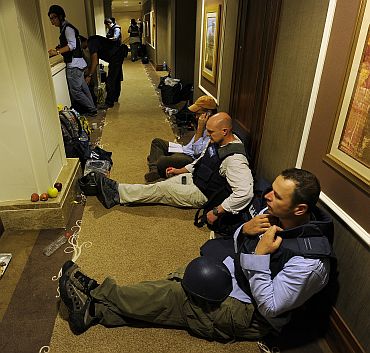
A day after rebel militia stormed his Bab al-Azizya compound in Tripoli, Libyan ruler Muammar Gaddafi is on the run. But the war in Tripoli though is far from over. Gaddafi loyalists, outnumbered but active, have been taking on the rebels in pockets of the Libyan capital.
Gaddafi loyalists still hold parts of the city and have control of the Rixos Hotel, headquarters of the foreign journalists accredited to the regime, preventing any of them from leaving.
Those inside include an Indian member of parliament, journalists from the BBC and ITN and former US congressman Walter Fauntroy, the Telegraph reported.
The identity of the Indian MP has not yet been ascertained.
The 35 hostages have been barred from leaving the building by gunmen brandishing AK-47s who have vowed to defend their country against rebels.
Food and water are running out, gunmen are "roaming the corridors" and snipers have been posted on the roof. Electrical power has also died in parts of the hotel.
...
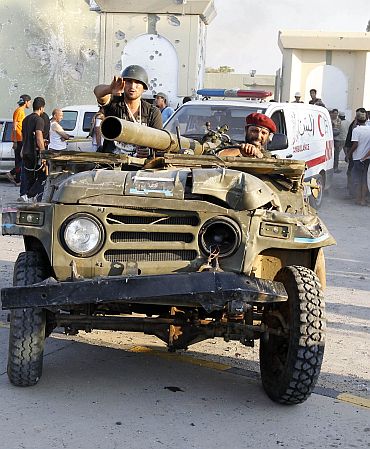
And Gaddafi has not given up yet. In a speech carried by the website of a television
station headed by his son Seif al-Islam, he said he had abandoned his Tripoli compound in a "tactical withdrawal" after it had been wrecked by NATO warplanes.
"Bab al-Azizya was nothing but a heap of rubble after it was the target of 64 NATO missiles and we withdrew from it for tactical reasons," he said.
In a later audio message on Syrian-based Arrai Oruba television station, Gaddafi urged residents to "cleanse Tripoli of rats."
He also said he had taken to the streets of Tripoli without being recognised.
"I walked incognito, without anyone seeing me, and I saw youths ready to defend their city," the strongman said, without specifying when he did his walkabout.
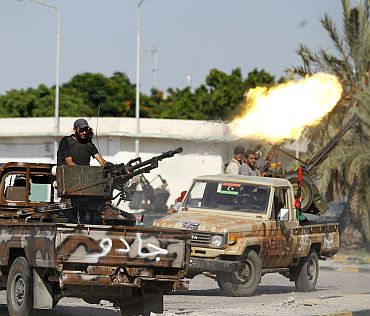
Gaddafi spokesman Musa Ibrahim struck an equally defiant tone when he said government forces have the power to fight in Tripoli "not just for months -- for years."
"We will turn Libya into a volcano of lava and fire under the feet of the invaders and their treacherous agents," Ibrahim said in a phone call to satellite news channels.
According to CNN, the tebels fully controlled the Tripoli International Airport, but were struggling to control an area east of it. The unexpected resistance caused them to speculate that loyalists could be protecting a high-profile figure in the vicinity.
Mustafa Abdel Jalil, head of the rebel National Transitional Council (NTC), said that the capture of Tripoli, which prolonged for 3 days, had left more than 400 killed and 2,000 wounded.
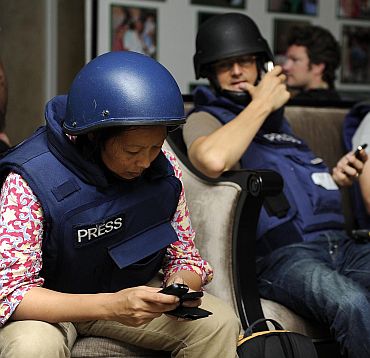
Meanwhile, Gaddafi spokesman Mussa Ibrahim has told the Syrian-based Arrai channel that over 6,500 "volunteers" had arrived in Tripoli to fight for the regime and called for more.
"The volunteers can come to Libya and we will give them weapons, ammunition and training," he said, adding that the dictator's forces had captured several rebel leaders and warned that if NATO raids continued "we will turn Libya into a brazier and we can protect civilians from the crusader gangs and alliances".
Gaddafi's son Saif al-Islam, who was presumed to have been detained by the rebels, surprisingly appeared on Tuesday at a hotel with foreign journalists, and reports suggest that some of the dictator's loyalist forces stubbornly resisted rebel efforts to take control of the capital.
Saif walked as a free man to the Gaddafi-controlled luxury Rixos Hotel in the center of Tripoli, boasting to foreign journalists there that his father's government was still "in control".
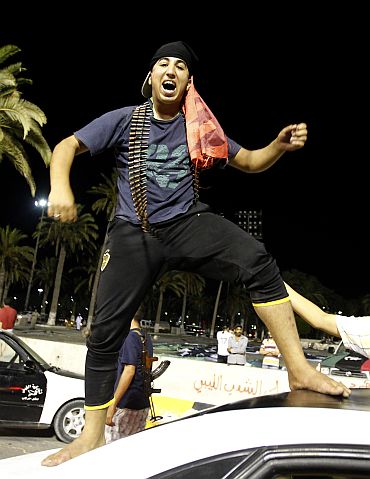
Even as jubiliant rebels combed the capital to hunt down Gaddafi loyalists, there is mounting concern among the international community about the possibility of Gaddafi unleashing his chemical weapon stocks to target rebels
"You can't anticipate everything the Gaddafi regime will do. They are a vicious regime.
They are in their death throes. There are people still out there. That's why we can't rule out any of those things," The Telegraph quoted British Foreign Secretary William Hague, as saying.
"These are still difficult and dangerous times in Libya. There are many weapons out there," he added.
The Pentagon also said that US armed forces are monitoring Gaddafi's chemical weapons sites.
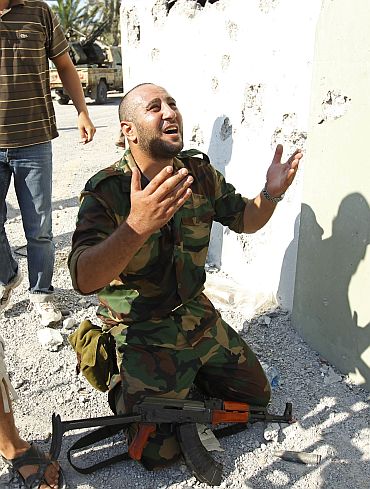
According to intelligence sources, the dictator still has up to 240 Scud B missiles that could be fired on civilians in a last attempt to retain his lost glory.
At least one Scud missile has already been launched from the Gaddafi stronghold in Sirte on the opposition held town of Misurata but fell off target, possibly into the sea, NATO officials said.
"The use of such Scud-type missiles presents a threat to civilians. They are a weapon of terror, it is utterly irresponsible," a NATO spokesman said.
Reports suggest that despite giving up most of his chemical and biological weapons programmes after 2003, Gaddafi had retained stocks of the chemicals required to make mustard gas.
The components were understood to be at desert sites closely monitored by Western spy satellites, the paper said.